High Court Opens for 2025 Criminal Calendar Session
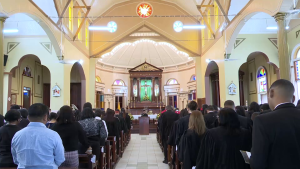 The 2025 legal year has officially commenced with the ceremonial opening of the High Court, a longstanding tradition marked by reverence and reflection. Amidst a light drizzle, Chief Justice Louise Blenman inspected the ceremonial guard of honour, embodying the resilience and commitment of the judiciary. Her address highlighted significant achievements of the past year, including the reduction of case backlogs, the introduction of criminal mediation, and a push towards digital transformation in the courts. As the judiciary looks ahead, new initiatives aim to further enhance the efficiency and accessibility of justice in Belize. News Five’s Marion Ali was there and has the following report.
The 2025 legal year has officially commenced with the ceremonial opening of the High Court, a longstanding tradition marked by reverence and reflection. Amidst a light drizzle, Chief Justice Louise Blenman inspected the ceremonial guard of honour, embodying the resilience and commitment of the judiciary. Her address highlighted significant achievements of the past year, including the reduction of case backlogs, the introduction of criminal mediation, and a push towards digital transformation in the courts. As the judiciary looks ahead, new initiatives aim to further enhance the efficiency and accessibility of justice in Belize. News Five’s Marion Ali was there and has the following report.
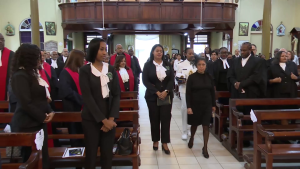 Marion Ali, Reporting
Marion Ali, Reporting
As per tradition, the ceremony marking the High Court’s official opening kicked off with a church service. This year, it was held at the Holy Redeemer Cathedral on the Northside of the Swing Bridge. In attendance were the Governor-General, Dame Froyla T’Zalam; Prime Minister John Briceño; Leader of the Opposition, Moses “Shyne” Barrow; members of the Judiciary, the Bar Association, and the Attorney General. Upon arrival in front of the court buildings and amidst a persistent drizzle, Chief Justice Louise Blenman inspected a guard of honour, conducted by members of the Belize Police Department. Just like the rain did not let up, neither did the plan to abort through with the parade, as the Chief Justice and everyone who was a part of the ceremony pressed on—the CJ under the shelter of an umbrella. Chief Justice Blenman said that the 2024 calendar was successful in reducing the backlog of cases through a number of improvements within the judicial system. One was the opening of a High Court in Belmopan and the appointment of more judges and expediting court rulings. There’s also been the introduction of criminal mediation, which has further reduced the backlog. These efforts have resulted in the waiting time for people on trial.
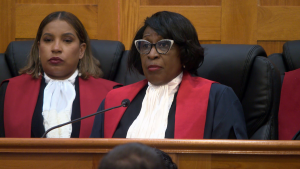
Louise Blenman
Louise Blenman, Chief Justice of Belize
“Three major reforms impacted the High Court: the resuscitation of the mediation committee, which was expanded into the alternative dispute resolution committee; training of a new cohort of court-connected mediators; and the implementation of the senior civil procedure rules 2025. We no longer have cases as old as fourteen years on the dockets. In just one year, the judges have been able to reduce the backlog of cases largely from fourteen years to four years. A comparative analysis of 2023 and 2024 statistics provided by the prison further reveals that persons are no longer spending an inordinate amount of time on remand prior to their matter being sent down for trial.”
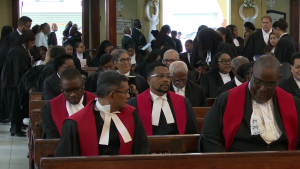 The overall turnaround time for processes to be completed at the criminal High Courts has been reduced significantly due to a set of transformational initiatives that have been put in place. She noted that this year, a professional administrative plan will be implemented for legally trained staff.
The overall turnaround time for processes to be completed at the criminal High Courts has been reduced significantly due to a set of transformational initiatives that have been put in place. She noted that this year, a professional administrative plan will be implemented for legally trained staff.
Louise Blenman
”With the support from PACE Justice Program, we are hoping to have a consultant with the requisite expertise in court administration assist us in finalizing our in house developed court administration plan. It cannot be overstated. hat any modern judiciary requires a court administrator to manage non-law aspects of our courts effectively and efficiently.”
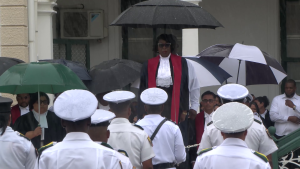 The Chief Justice also spoke of the hope for further upgrades, such as the digitalisation of the courts’ registry and the use of AI.
The Chief Justice also spoke of the hope for further upgrades, such as the digitalisation of the courts’ registry and the use of AI.
Louise Blenman
“We will explore the possibility of having our registry completely digitalized, including the probe division. We are hoping to ethically explore the use of artificial intelligence system software to deal with non-contentious aspects of the court’s work. This should alleviate some of the human resource challenges that we face.”
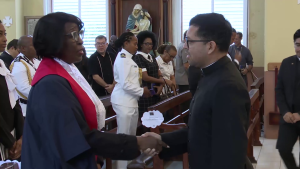 And while Chief Justice Blenman pointed out several of the judiciary’s new strengths, there was one area that she highlighted that could use some improvement.
And while Chief Justice Blenman pointed out several of the judiciary’s new strengths, there was one area that she highlighted that could use some improvement.
Louise Blenman
“The listing of cases for hearing in the Court of Appeal seriously impeded by the lack of availability of high court trial transcripts. An unfortunate consequence of the lack of trial transcripts is that relatively few appeals are ready to be listed for hearing. As a corollary, the dispensation of justice is ingloriously stemmed at the level of the appellate court. The situation is untenable and is caused to a large extent by the difficulties with the recording technology that was used in the high courts over the years and also the paucity of stenographer trainees to produce the transcripts.”
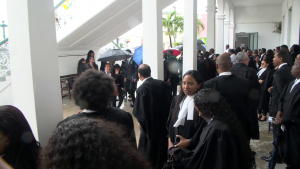 This weakness in the system will be addressed, the CJ assured, and shared that in 2024, counsels for the parties in appeal cases have been urged to use their personal notes of agreed records of lower court proceedings in order to get some of the appeal cases heard. Funding has been provided, she said, to attain a speech-to-text system to expedite that process.
This weakness in the system will be addressed, the CJ assured, and shared that in 2024, counsels for the parties in appeal cases have been urged to use their personal notes of agreed records of lower court proceedings in order to get some of the appeal cases heard. Funding has been provided, she said, to attain a speech-to-text system to expedite that process.
President of the Bar Association, William Lindo, commended the judiciary for the achievements over the past year.
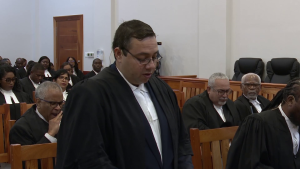
William Lindo
William Lindo, President, Bar Association of Belize
”We applaud the judiciary under the able stewardship of Her Ladyship, the Chief Justice, for the remarkable achievements accomplished over the past year, which include of the long awaited Senior Court Civil Procedure Rules, which brings with it a raft of practice directions and sentencing guidelines, court connected criminal mediation rules, judicial settlement conferences, numerous training sessions and conferences, Under the auspices of the Judicial Education Institute of the Senior Courts of Belize, with training and sensitization for the new Senior Court Civil Procedure Rules, scheduled to take place this Thursday.”
The Attorney General, Anthony Sylvestre, spoke of the various bills that are designed to improve the delivery of justice. He spoke about the new Bail Act that will be introduced shortly.
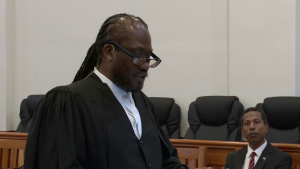
Anthony Sylvestre
Anthony Sylvestre, Attorney General
“ Currently, the provisions that govern bail are found in six pieces of legislation. Having so many different pieces of legislation that governs the same issue is therefore counterproductive, as it may become difficult to discern how the law operates. Having a single piece of legislation on bail therefore improves, improves unity and cohesion and makes the law easier to understand. In addition to centralizing the provisions relating to bail, this new act will introduce some much-needed features in bail proceedings, some of which includes an appeals process against a decision refusing bail, a process that allows for the revision of a decision on bail. The requirement that the decision, the deciding official shall provide reasons in considering a bail application, and a comprehensive list of factors that a deciding official shall consider when determining a bail applications.”
CJ Blenman took time to pay gratitude to the Ministry of Infrastructure Development and Housing for the newly refurbished court buildings, with new amenities and furniture. Marion Ali for News Five.





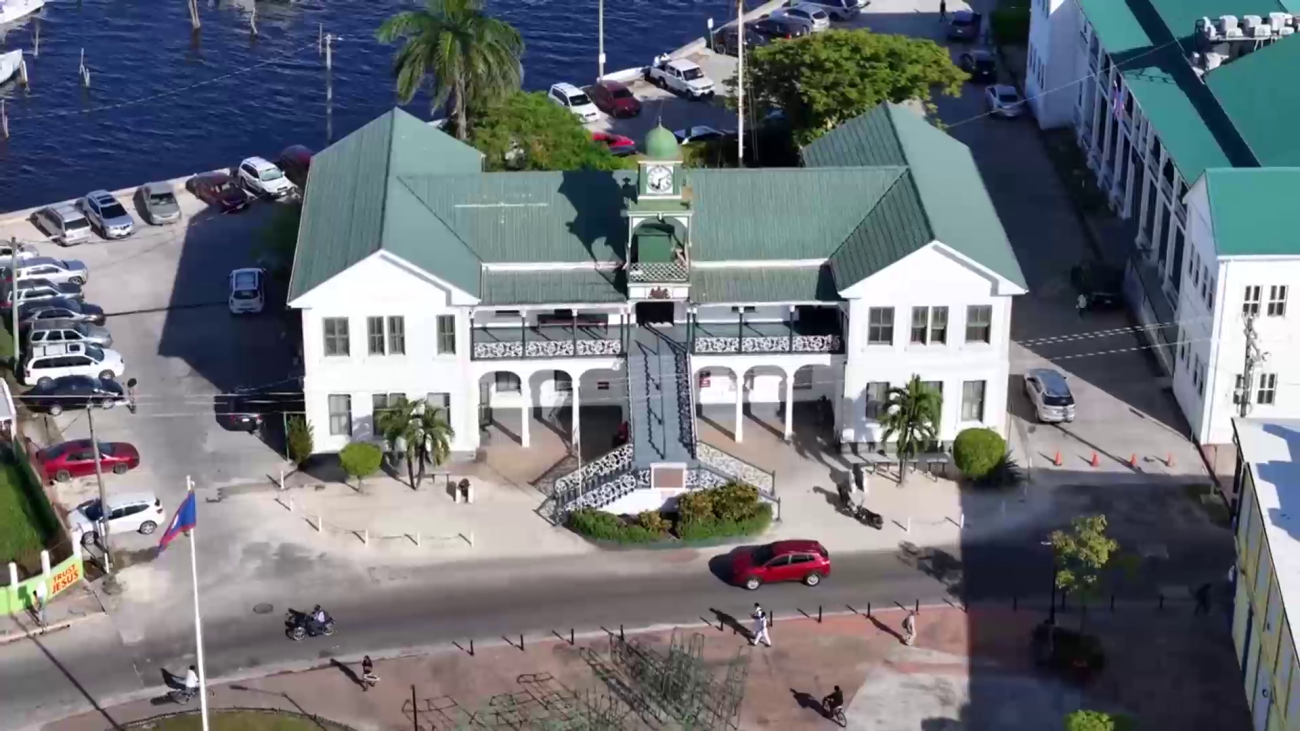

Facebook Comments